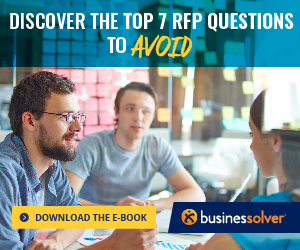Businessolver identifies 7 pitfalls to avoid when generating RFPs

For technology companies that partner with other businesses in ventures, Requests For Proposals are the main way to evaluate potential relationships.
Unfortunately, too many RFPs have the same downfalls, leaving businesses uninformed, misinformed, or confused as to how the vendor will help promote sales.
That's why Businessolver wrote its new e-book "The Top 7 Off-Target RFP Questions." This book goes through the seven most common RFP questions for evaluating benefits administration technology and services vendors, and suggests how the right information can be gained with better questions.
The authors say the primary downfall of many RFPs is the consistent appearance of superficial questions like "Can you confirm that your technology will accept data in our defined format?" These questions are problematic because the responses are often vague and do not address specific issues pertaining to the potential client's needs.
Instead, Businessolver suggests you ask questions about a specific feature, like a format or application. Best of all, ask for examples and samples. Examples should be a mainstay in your RFP, especially if you want to integrate with your vendors. Without examples, you can be sure your request will be processed slower, you'll get imprecise answers from vendors, and -- worst of all -- you will waste your staff's time.
You should include with your list of carriers the frequency of data exchanges and the types of plans each vendor provides, according to the authors. This will help a possible vendor determine whether an integration is either possible or practical.
Another foolish question examined in the book is "Can you allow for a single sign on?" This question makes it impossible for a vendor to answer with any clarity or specificity. They need to know what you intend to achieve with the SSO. That helps them determine how to offer you meaningful insight into their solutions.
The authors say you need to add any examples of SSOs you use with current carriers or vendors and the results of each. Adding what specific purpose you want the SSO to serve for each of your systems will give your RFP more weight in the vendor's hands.
Asking a vendor if they can support your enrollment fulfillment requirements goes just as far. You may as well ask a real estate agent if the house they're about to show is big enough without telling them the specifications you need in a home.
Instead, Businessolver suggests you ask the vendor if they can support a specific enrollment number. If you can't provide specific samples, provide descriptions such as page number, document size, and type of distribution -- whether electronic or paper.
The more specific you make your RFP, the better it will look in your prospective partner's eyes. Simply put, just say no to foolish questions. Be as specific as possible in all sections of your RFP. There is no need to request information that is vague or not tailored to your company's needs because it won't benefit your organization or a prospective vendor.
Businessolver encourages you to use the RFP process to show your prospective business partner that you have their best interest at heart. That will plant the seed toward a long-lasting relationship that will mutually benefit your businesses.



 Alerts Sign-up
Alerts Sign-up